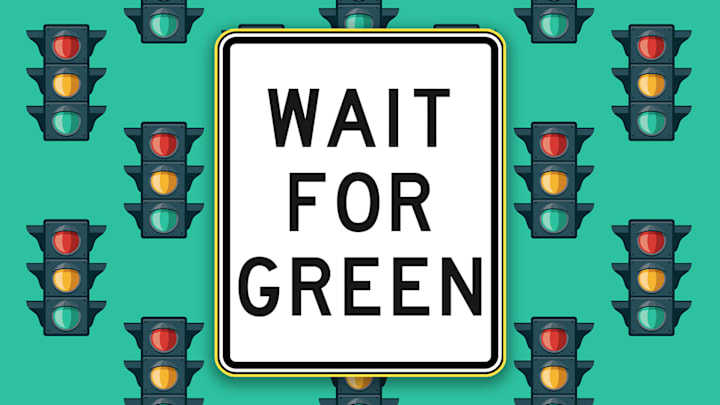Not every licensed driver knows the meaning behind every symbol on their dashboard or every sign along the road. They might not even remember the difference between a yellow traffic line and a white one.
If there’s one thing most U.S. residents—from licensed drivers to children—do know, though, it’s that a red light means “stop” and a green one means “go.” So it seems pretty redundant to post a sign right next to a traffic light instructing you to “wait for green.”
But it’s not really about telling drivers which color is the go-ahead: It’s about reminding them to take their cues from the traffic lights, not the other drivers. If you see a “wait for green” sign at an intersection, it means that the traffic directly across from you is going to get a green light slightly before you do. As that opposing traffic starts moving, you might automatically follow suit—either out of habit, or because you assume your own light is faulty and actually was supposed to turn green when theirs did. If you don’t heed the “wait for green” directive and hit the gas immediately, you’re running the risk of crashing into whatever opposing traffic is turning left on green.
Can You Turn on Red With a “Wait for Green” Sign?
Some people assume that “wait for green” is really short for “wait for green before turning.” It’s not: You can still turn on red with a “wait for green” sign—unless, of course, there’s also a “no turn on red” sign.
Don’t be surprised if you’ve never seen a “wait for green” sign in the wild. For one thing, they seem to be spotted mostly (if not exclusively) in Pennsylvania. For another, according to Allentown, Pennsylvania’s The Morning Call, the state discontinued them way back in 1999. A spokesperson for the Pennsylvania Department of Transportation told the newspaper that “wait for green” signs were added to roads when drivers were still acclimating to sensor-controlled traffic lights, but today’s drivers generally just find them confusing. Instead of spending the money to take them all down at once, the department decided instead to just have them removed on an as-needed basis as they deteriorate with age.
Have you got a Big Question you'd like us to answer? If so, let us know by emailing us at bigquestions@mentalfloss.com.
